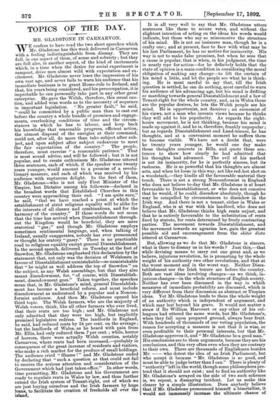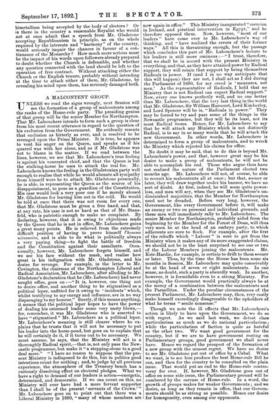TOPICS OF THE DAY.
MR. GLADSTONE IN CARNARVON.
WE confess to have read the two short speeches which Mr. Gladstone has this week delivered in Carnarvon with a feeling indistinguishable from dismay. They are full, in one aspect of them, of sense and sobriety ; but they are full also, in another aspect, of the kind of incitements which, in a time when the desire for social experiment is rampant, drive men almost wild with expectation and ex- citement. Mr. Gladstone never loses the impression of his own vast age, and never fails to warn his audience that his immediate business is to grant Home-rule to Ireland, and that, his years being considered, and his preoccupation, it is improbable he can personally take part in any other great enterprise. He gave the Welsh, therefore, this usual cau- tion, and added wise words as to the necessity of sequence in important legislation. "No greater fault," he said, "could be committed by a public man than to cast out before the country a whole bundle of promises and engage- ments, overlooking conditions of time and the circum- stances in which he has to labour, and keep back his knowledge that reasonable progress, efficient action, the utmost disposal of the energies at their command, could not, after all, do more than take subject after sub- ject, and upon subject after subject endeavour to meet the fair expectations of the country." The people, therefore, must exercise "a reasonable patience." That is most sound advice, and will be followed ; but it is not popular, and to create enthusiasm Mr. Gladstone uttered three sentences, each of which, if the speaker were twenty years younger, would amount to a promise of a revolu- tionary measure, and each of which was received by his audience with rapturous delight. In the first of them, Mr. Gladstone—who is not only First Minister of the Empire, but Dictator among his followers—declared in the broadest words that Established Churches in this country were approaching their end. "I am quite sure," he said, "that we have reached a point at which the establishment of strict religious equality will be alike for the interests of all classes and combinations, and for the harmony of the country." If those words do not mean that the time has arrived when Disestablishment through- out the Kingdom would be beneficial, they are mere oratorical " gas ;" and though Mr. Gladstone employs sometimes sentimental language, and, when talking of Ireland, usually exaggerates, nobody has ever pronounced or thought his oratory "gassy." There is no practicable road to religious equality except general Disestablishment. In the second speech, delivered on Tuesday at the foot of Snowdon, Mr. Gladstone emphasised this declaration by the statement that, not only was the decision of Welshmen in favour of Disestablishment unmistakable—so unmistakable that "he might as well address the top of Snowdon" on the subject, as any Welsh assemblage, but that they also meant disendowment, for, "of course, with Disestablish- ment, disendowment goes." Taken together, the speeches mean that, in Mr. Gladstone's mind, general Disestablish- ment has become a beneficial reform, and must include disendowment as understood by a popular and a Noncon- formist audience. And then Mr. Gladstone opened his third topic. The Welsh farmers, who are the majority of Welsh voters, think, like all other farmers who ever lived, that their rents are too high ; and Mr. Gladstone not only admitted that they were too high, but implicitly promised legislative redress. The landlords in England, he said, had reduced rents by 24 per cent. on the average ; but the landlords of Wales, as he heard with pain from Mr. Ellis, had only reduced them 7 per cent. ; while, horror of horrors, there were actually Welsh counties, notably Carnarvon, where rents had been increased,—probably in consequence of the great increase of residents and visitors, who make a rich market for the produce of small holdings. The audience cried " Shame ! " and Mr. Gladstone ended by declaring that "such a question as that could not fail to receive the serious attention and consideration of the Government which had just taken office." In other words, time permitting, Mr. Gladstone and his Government are ready to regulate rents in Wales by law, and thus further extend the Irish system of Tenant-right, out of which we are just buying ourselves and the Irish farmers by huge loans, to facilitate the creation of freeholds all over the Wand. It is all very well to say that Mr. Gladstone utters sentences like these to secure votes, and without the slightest intention of acting on the ideas his words would indicate, but those who say so misconceive the structure of his mind. He is not an insincere man, though he is a crafty one ; and at present, face to face with what may be his last Parliament, he has no motive for insincerity. His. way is not to make false promises, but when he sees that a cause is popular, that is when, in his judgment, the time is nearly ripe for action—for he definitely holds that the state of opinion is a main condition in considering the moral obligation of making any change—to lift the curtain of his mind a little, and let the people see what he is think- ing. He is most careful to say that, till the Irish question is settled, he can do nothing, most careful to warn his audience of his advancing age, but his mind is drifting or marching towards general Disestablishment and a law of Tenant-right for the whole country, and, as in Wales those are the popular desires, he lets the Welsh people see his mind. He is opportunist, not deceiver ; an economist of his views, not a man who invents views because he thinks they will add to his popularity. As regards the eight- hours movement, he is not thinking, because his mind is made up against it, and he is, therefore, frankly unpopular ; but as regards Disestablishment and Land-tenure, he has thoughts, and at a convenient moment he suffers them to become visible. We have not a doubt that, were he twenty years younger, he would one day make those thoughts concrete in Bills, and quote these sen- tences to show how clearly he had admitted that his thoughts had advanced. The evil of his method is not its insincerity, for he is perfectly sincere, but its rashness. He is so powerful that his thoughts are almost acts, and when let loose in this way, act like red-hot shot on a woodstack,—they kindle all the favourable material they touch. There is not a strong Nonconformist in England who does not believe to-day that Mr. Gladstone is at heart favourable to Disestablishment, or who does not conceive that he would, if he could, disendow absolutely, though he may be compelled by circumstances to disendow in the Irish way. And there is not a tenant, either in Wales or England, who is at war with his landlord, who does not believe that Mr. Gladstone thinks high rents unjust, and that he is entirely favourable to the substitution of rents fixed by statute, for rents determined by freely contracting parties. The movement towards Disestablishment, and the movement towards an agrarian law, gain the greatest possible aid and encouragement from the ()biter dicta uttered at Carnarvon.
But, allowing as we do that Mr. Gladstone is sincere, what is there to dismay us in his words ? Just this,—that while devising means to carry out one great and, as we believe, injurious revolution, he is promoting by the whole weight of his authority two other revolutions, and that at the worst moment and in the worst way. Neither Discs- tablishtnent nor the Irish tenure are before the country. Both are vast ideas involving changes—as we think, in- jurious changes—in the whole structure of English society. Neither has ever been discussed in the way in which measures of immediate probability are discussed, which is very different from their discussion as abstract or Utopian ideas. Yet Mr. Gladstone lends to them the whole weight of an authority which is independent of argument, and which may last beyond his grave. It would not matter a straw if Sir William Harcourt or any other of his col- leagues had uttered the same words, but Mr. Gladstone's, when they fall upon prepared ground, always bear fruit. With hundreds of thousands of our voting population, the reason for accepting a measure is not that it is wise, or even profitable to their personal interests, but that Mr. Gladstone approves it, and "Mr. Gladstone be a good man." His conclusions are to them arguments, because they are his conclusions, and this very often even when they are contrary to their own. There are thousands of Englishmen besides Mr. — who detest the idea of an Irish Parliament, but who accept it because "Mr. Gladstone is so good, and must be able to judge better than I can." There is plenty of "authority "left in the world, though some philosophers pre- tend that it should not exist ; and to find an authority like Mr. Gladstone's arrayed on the side of two such schemes is, we repeat, a dismaying incident. Let us make this clearer by a simple illustration. Does anybody believe that if Mr. Gladstone pronounced himself a bimetallist, it would not immensely increase the ultimate chance of bimetallism being accepted by the body of electors ? Or is there in the country a reasonable Royalist who would not at once admit that a speech from Mr. Gladstone accepting Republicanism in principle, as on the whole required by the interests and "harmony" of the country, would seriously impair the chances in favour of a con- tinuance of the Monarchy ? How much more serious must be the impact of his words upon followers already prepared to doubt whether the Church is defensible, and whether any question connected with the land should be left to the operation of free contract. Without attacking either the Church or the English tenure, probably without intending at the time to attack either of them, Mr. Gladstone, by revealing his mind upon them, has seriously damaged both.



































 Previous page
Previous page